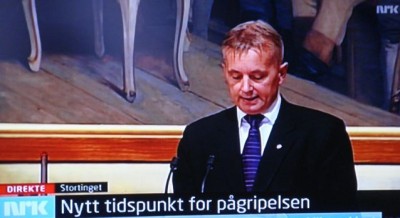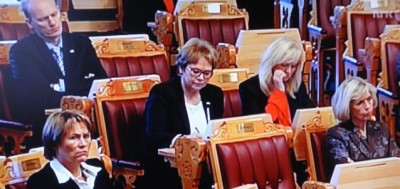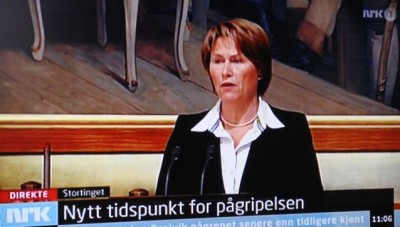Opposition parties in Parliament had expected a humble admission from Justice Minister Knut Storberget that mistakes were made during the response to the terror attacks of July 22. They got one, of sorts, when Storberget addressed Parliament on Thursday.

Both Storberget and Defense Minister Grete Faremo had been called in to answer a long series of questions that’s been growing since a lone Norwegian bomber and gunman killed 77 persons and wounded scores more during the attacks. Storberget repeated that the responsibility for one of the worst mass murders in history must be borne by the assailant, confessed terrorist Anders Behring Breivik, alone. He noted that “we all have tough days behind us.”
He conceded, though that “we must look at areas where we could have done things better” when emergency crews responded to the attacks. He also agreed that not all answers can wait until a state commission investigating the emergency response has filed its report next year. The public, Storberget said, should be informed about facts that are known “already now,” and in areas “where we see room for improvement, there’s no reason to wait.”

Trine Skei Grande, leader of one of the smallest opposition parties in Parliament (Venstre), had been heard on national radio channel NRK1 earlier in the morning, claiming that she expected an admission from Storberget “that we have erred as a nation” The most important thing a country must do, she claimed, “is to protect its citizens, and we didn’t manage that.”
Erna Solberg and Andre Oktay Dahl of the Conservatives (Høyre) also wanted to see some self-criticism on the part of government ministers, along with answers to what could have been done to better protect Breivik’s victims. Storberget responded to some of their questions, but said many must wait until the commission finishes its work.

He stressed that an evaluation of the response to the bombing of government headquarters and a massacre at his Labour Party’s summer camp on the island of Utøya must be based on what was known at that time. “We didn’t know if there was still danger (of more attacks) in Oslo,” Storberget said, reminding Members of Parliament that experience from attacks in other cities often shows there are more. Those heading for the bombing site and the island, he stressed, didn’t know what awaited them.
The much-criticized response to Breivik’s massacre on the island was affected by a lack of information on whether there was more than one gunman, Storberget said, and whether there were explosives placed on the island. Storberget could tell MPs that Breivik was actually arrested a few minutes later than initially reported, at “between 18:32 and 18:34,” instead of 18:27 (6:27pm). He declined, however, to answer specific questions about decisions made during the massacre response, regarding, for example, choice of boats to get to the island, leaving that to the commission.
Call for a new preparedness center
Storberget called for establishment of a new terror preparedness center in Oslo, to better coordinate emergency response, not least between police and the military. He envisions a center with representatives from the police, the military, the police intelligence unit PST, state communications officials and social welfare agencies that help victims and survivors.
He and Defense Minister Grete Faremo also suggested a review of constitutional definitions of the roles of the various state departments, with an eye to allowing for more cooperation among them. “We must have a discussion on how we can have further cooperation within the constitutional framework,” he said, “like whether the military should contribute more to civilian society.”
Faremo told MPs that it emerged quickly on July 22 that the attacks were “a major criminal” offense and thus the responsibility of the police. She said five written appeals came in for help from the military, including one for use of its special commando units, and suggested a need for pro-active warning systems and clearer instructions to speed cooperation on police use of military bomb teams, air support and securing of buildings.
Probing PST, too
Terror prevention measures also must reflect current threat levels, Storberget said. PST has viewed Islamic extremists as posing the biggest threat, while all forms of extremism, also from right-wing anti-Islamists, must be monitored. Storberget also believes that the role of PST before and after July 22 should also be examined, something the opposition already has demanded.
Response from the opposition indicated satisfaction with Faremo’s and Storberget’s reports. Some criticized the time it took for the police and military to launch formal cooperation. But Solberg of the Conservatives agreed with Storberget that the assailant, and him alone, has responsibility “for these gruesome events.” Both the government politicians and those from the opposition generally refrain from actually using Breivik’s name.
Views and News from Norway/Nina Berglund
Please support our stories by clicking on the “Donate” button now:

